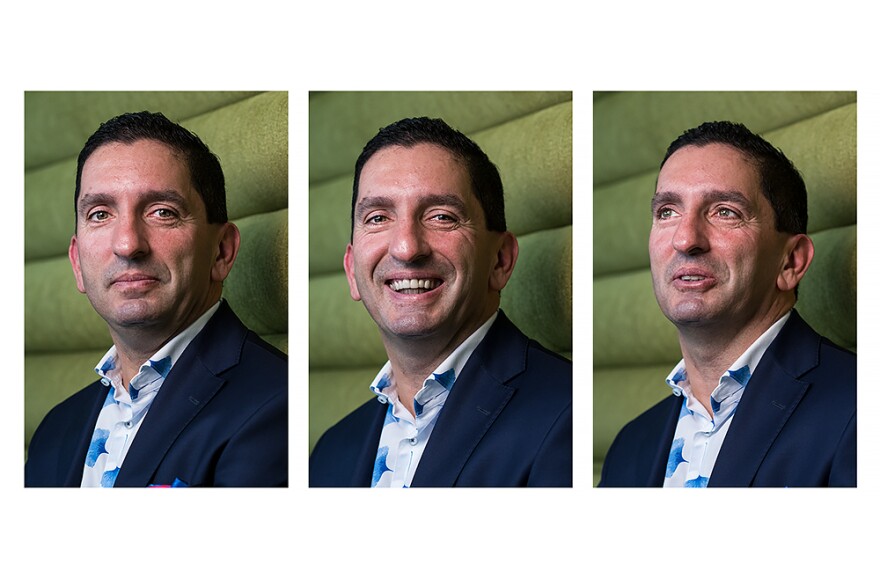Sometimes, spending time with family can change your life’s direction. That's what happened when one trip to Missouri rooted entrepreneur Faruk Capan, and his business, in the Midwest.
When Capan was in early 20s, his cousin was a student at what’s now known as University of Central Missouri in Warrensburg. He invited Capan, who grew up in Istanbul, Turkey, to visit. It was August and school was about to start.
"It was just hot, 100 plus degrees. Cicadas are chirping," Capan recalled. "It’s a very small place. And I called my mom and kind of cried on the phone to say, 'This is not the America I was coming for.'"
The America he was coming for, Capan said, was his planned move to Virginia for a master's degree. But, in 1990, he decided to stick it out in Missouri, which resulted in what he said were the "best two years of my life, probably from school-wise."
Getting the 'entrepreneurial itch'
Capan earned his MBA, and then got an internship at the pharmaceutical company Marion Merrell Dow when Ewing Kauffman was still a dominant force. Capan said he looked to Kauffman for inspiration.
"I was really indoctrinated into his culture, his values, from a very early age," he said. "I fell in love with the company."
And like Kauffman, Capan said, he knew he had the "entrepreneurial itch." But through the 1990s, he took on roles at other pharmaceutical companies such as Sanofi and Teva Neuroscience (then known as Teva Marion Partners). And he got into online marketing in the early days of the internet.
"I keep going to my boss: 'There is something here, there is something here, we should invest here.' And he kept telling me, 'You know, we are conservative, you’re making too many waves.'"
But Capan said he saw a problem.
"We are a startup company. We have to re-invent ourselves almost every year."
The pharmaceutical industry is highly regulated, and the internet was still so new that if patients asked a pharmaceutical company a question on a website, it could take weeks and sometimes months to get an answer.
That was too long, Capan thought, and he wanted to create a shortcut. So he got some seed money, and built a portal so people with multiple sclerosis could talk to each other.
"And I was a maverick, basically, an entrepreneur," he said. "My boss finally said, 'I don’t want to fire you – but maybe you should start your company.'"
Staying a startup company after 20 years
That’s exactly what he did.
"I actually quit my job suddenly with no major plan, but I thought this was the right thing to do. And I basically started Intouch Solutions, not from my basement, but from my home."
Capan started his business with one employee in 1999, looking at challenges in healthcare and creating new tools such as websites, widgets and apps, for doctors and patients. He gave himself at least six months to make it work
Intouch Solutions now has more than 700 employees, with offices in New York City, Chicago, London and Kansas City.
"The joke is we are now a 700-person, 18-year start-up," Capan said. "We are a startup company (because) we have to re-invent ourselves almost every year."
This re-invention keeps him galvanized, he said, trying to anticipate what's next. And the company is growing to meet the demand.
Creating community through innovation
The company takes up four floors of an office building in Overland Park, Kansas. On the third floor there's an employee lounge with fresh fruit, coffee, and beer taps for happy hours.
"So it’s really trying to bring them here as a community," Capan said, "bring them, share here."
When Capan moved to the U.S. nearly three decades ago, it took energy, drive and lots of paperwork. And these days there are even more challenges for new immigrants. As a result, he said, his company can't hire all the talent it wants because of the visa restrictions.
But, he would argue, immigrants continue to bring value with their innovations and inventions.
"Yes, I have an accent. Yes, I wasn’t born here, but I’m no less American than anybody else," said Capan, who's now a U.S. citizen. "I feel that way."
So if you're searching the internet to find out more about a health issue such as eczema, or trying a mobile app that shows you what it's like to have a degenerative eye disease — the kind of things that Intouch Solutions develops — it's probably for the best that Faruk Capan decided to follow his dream.
This story is part of KCUR's series “Taking a Risk,” where we explore the stories of immigrant entrepreneurs in Kansas City and the challenges of starting something new.
Laura Spencer is an arts reporter at KCUR 89.3. You can reach her on Twitter at @lauraspencer.





